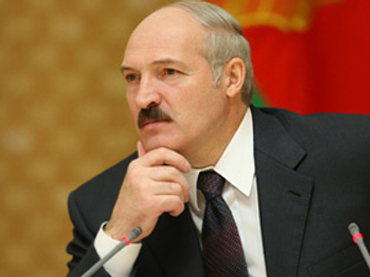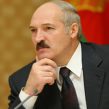
The Prospective Eurasian Treaty and Lukashenka’s Loyalties
Publication: Eurasia Daily Monitor Volume: 11 Issue: 87
By:

On April 29, a meeting of the national leaders of the planned Eurasian Economic Community (EEC), Vladimir Putin of Russia, Nursultan Nazarbaev of Kazakhstan, and Alyaksandr Lukashenka of Belarus, took place in Minsk. From the Belarusian standpoint, it proved to be a disappointment. Specifically, the alleged and much trumpeted concessions by Russia to cancel the export duty on refined oil products exported from Belarus, in conjunction with the creation of the frontier-free market, have not materialized. Obligated to transfer this duty to the Russian budget, in 2013, Belarus contributed to it $3.3 billion. During the aforementioned meeting, the Russian side expressed willingness to eventually eliminate that fee no earlier than in ten years. In the meantime, it will be subject to bilateral negotiations (Ria.ru, April 29).
Despite this setback, it was announced that the EEC treaty, which will usher in the Eurasian Union by January 1, 2015, is supposed to be signed on May 29 in Astana, Kazakhstan (https://news.tut.by/economics/397153.html). Apparently, the attempts to break Russia’s resistance are still going on. Nevertheless, Lukashenka himself mentioned, during his May 3 visit to the Belarusian-Chinese joint-stock company BelGee (which produces Geely cars), that “today we are conducting a dialogue with Russia about how to [resolve] those issues. They will be resolved soon… Otherwise we cannot enter this economic union on unequal conditions” (https://www.belta.by/ru/all_news/president/Belarus-ne-mozhet-v-uscherb-sebe-vojti-v-EES-na-neravnyx-uslovijax—Lukashenko_i_667875.html).
Meanwhile, government-friendly analysts question the logic behind Belarus engaging in special bilateral negotiations with Russia in order to resolve contradictions within the EEC when, in fact, there is already a format for bilateral consultations in place called the Union State of Russia and Belarus. According to Alexander Shpakovsky, creating the EEC before leveling the economic playing field would create something along the lines of the core-periphery World System model authored by Emmanuel Wallerstein, whereby just the core—in this case Russia—stands to gain (https://ng.by/ru/issues?art_id=84526). Despite the fact that May 29 is around the corner, the outcome of the talks between Russia and Belarus is entirely unclear, adding suspense to the entire endeavor. Will Lukashenka risk snubbing Putin? Will Putin allow his integration project to fall victim to national egotism? Was this issue even discussed during a telephone conversation between Putin and Lukashenka on May 5? (https://news.tut.by/politics/397726.html).
Sluggish economic growth and potential Western sanctions may explain Russia’s reluctance to cancel the oil-product export duties. Also, in the new atmosphere informed by the rise of Russia’s imperial nationalism, Lukashenka’s tactics of maneuvering between Russia and the West on Ukraine have become subject to enhanced attention. Thus, according to liberal Westernizer and commentator on RIA Novosti Vadim Dubnov, by speaking against Ukraine’s federalization, Lukashenka is dissociating himself from Russia in the eyes of the West. Likewise, by reasserting the significance of the Belarusian language, Lukashenka effectively props up Belarusian identity since he does not want to “convert Belarus into eastern Ukraine,” whose identity is equally blurred. Dubnov does not believe that Lukashenka would ever “lead Belarus to Europe” because “his motivation [to do so] does not surpass that of [former Ukrainian president Viktor] Yanukovych. But if anybody would protect Belarus from [missing out on] the chance to [one day] become part of Europe, it is actually Lukashenka” (https://www.novayagazeta.ru/comments/63362.html).
Rarely does an acknowledgment like this emanate from the liberal-Westernizing side of the political spectrum. Yet another voice from the same flank, Victoria Zakrevskaya from a Minsk-based think tank funded by the West, suggests that Lukashenka’s decision to decline to participate in the Prague summit of the European Union’s Eastern Partnership (see EDM April 30) was a “tactically sophisticated and maybe even a respectable move.” It served to signal that Minsk will avoid cooperating fully with such European initiatives until the West accepts Belarus for what it is and stops pressing it on issues that appear to be of secondary significance given the present circumstances. Likewise, Yury Drakakhrust from the Belarusian service of Radio Liberty observes that Lukashenka effectively behaves the way former Romanian Communist leader Nicolae Ceausescu did. He was a committed communist, but he distanced himself from Moscow; and that was quite enough for him to earn recognition by the West (https://naviny.by/rubrics/eu/2014/05/04/ic_articles_627_185390/).
As if to second the aforementioned opinions, Kirill Averyanov-Minsky, writing on a staunchly pro-imperial Russian portal, excommunicates Lukashenka from the “Russian world.” According to Averyanov-Minsky, Lukashenka was hypocritical when he repeatedly suggested that Russians and Belarusians are one and the same people. Reasserting Belarus’s independence at this point in time comes across to the quoted author as treason. Moreover, when Lukashenka criticized those who were “insinuating” that Russians are discriminated against in Belarus (see EDM April 30), he reportedly showed his true face. The unnamed provocateur was actually Andrei Gerashchenko who, in 2011, was fired from his job (in the Belarusian military) for publicly calling Belarusians a variety of Russians. On the Belarusian language, Averyanov-Minsky senses that Lukashenka committed an about-face—from disparaging to extolling it. And this is nothing short of sinister, according to the aforementioned author, as are Lukashenka’s statements against the federalization of Ukraine and about the necessity to fight any aggressor, even if he comes from the East (sputnikipogrom.com, May 4).
What is interesting in this approach is that the idea—seemingly mistaken to begin with—that Lukashenka is a Russian nationalist is being persistently disproved. And this leaves no room for the Belarusian leader to be, essentially, a kind of Belarusian nationalist but still culturally and politically close to Russia. Apparently even if one believes that Belarus and Ukraine are the subjects of a genuine geopolitical tug of war between Russia and the West (https://www.foreignaffairs.com/articles/141211/walter-russell-mead/the-return-of-geopolitics), the Russian side appears to be more zealous and demanding of each subject’s soul and allegiance. Russia wants all of you, period. And it has no qualms saying so.




